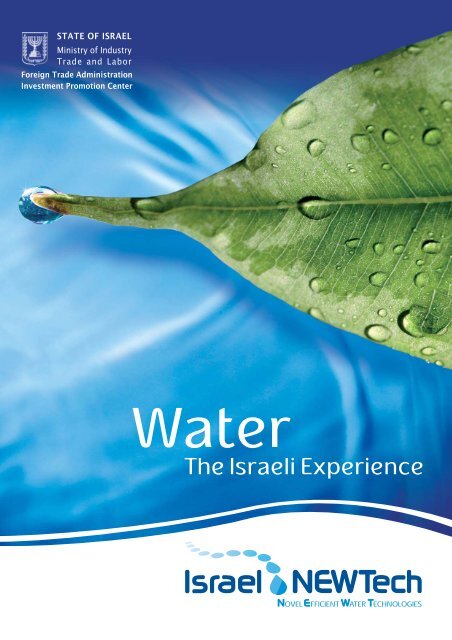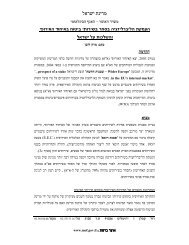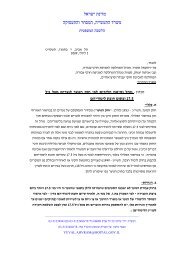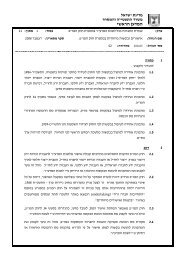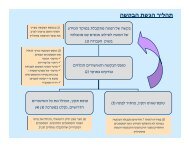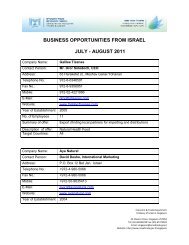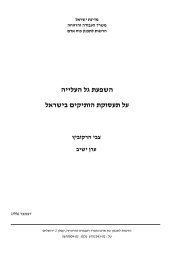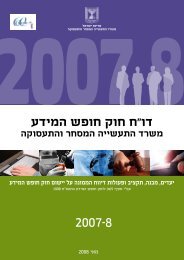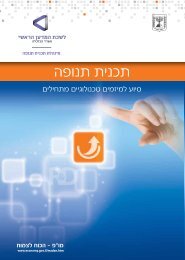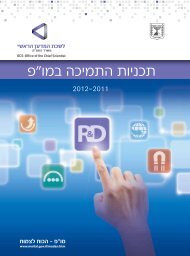Novel Efficient Water Technologies
Novel Efficient Water Technologies
Novel Efficient Water Technologies
You also want an ePaper? Increase the reach of your titles
YUMPU automatically turns print PDFs into web optimized ePapers that Google loves.
Agricultural Solutions – The Roots of Israeli <strong>Water</strong> TechnologyIsrael has achieved a significant drop in agricultural waterconsumption, despite a yearly rise in agriculturalproduction, through increasing water efficiency inagriculture and developing advanced methods ofirrigation. In spite of low water supply, the countryproduces most of its own food requirements.Fast Facts:• 70% of global water consumption ischanneled into agriculture.• 82% of water consumption indeveloping countries is forToday, the sector in Israel is based almost entirely on agriculture.R&D, with academic institutions, cooperative agriculturalbodies and government agencies working collaboratively to seek solutions for water problems.Drip Irrigation: With Just a Drop of <strong>Water</strong>The international market for drip irrigation solutions isestimated at $2 billion and Israeli companies are leading,with a 40% market share.Israel established its reputation as leader in watertechnologies in the early 1960's when Israeli researchersIsrael's R&D Model:Two-way flow of informationbetween researchers and farmersProblems in the field are broughtdirectly to researchers to developspecific solutions, while scientificresults are quickly field-trialed.and farmers created drip irrigation technology. This innovation addressed the worldwide demand forefficient, water saving irrigation techniques and created a global drip irrigation market.Drip irrigation is based on the straightforward concept of maximizing the efficiency of a limitedquantity of water by dripping it onto strategic points through plastic piping. Drip irrigation technologysuccessfully:• Limits evaporation• Minimizes water wastage• Reduces the requirement for fertilizers and chemicals• Enhances the capacity to effectively control plant disease6
Advancements in Drip Irrigation Technology:Methods to optimize the quality and quantity of waterbased on soil type:• Unique features to use saline or brackish waterthat prevent salt accumulation at the roots.• Buried irrigation, in which lateral pipes are buriedat a depth of 50 centimeters - at the plants roots.• Line drippers, regulated and unregulated fixeddrippers, and integrated drippers, which arepre-cast onto the wall of the irrigation lines.• Distribution of fertilizers through drip irrigationsystems, which ensure that components, such asphosphorous, directly reach the roots.Israeli companies like Netafim, Naan-Dan and Plastroare world leaders in drip-irrigation technologies.Facts about Israeli Agricultureand Drip Irrigation:• Drip irrigation has the highest waterefficiency rate in agriculture,reaching a 70%-80% rate, versusopen irrigation, which achieves40%.• According to BusinessWeek 1 ,Israeli firms control half of theestimated $1 - $1.5 billion globalmarket of Drip Irrigation.• Israel exports more than 80% ofits irrigation solutions.• Israel uses drip irrigation on 60%of agricultural land, compared toonly 6% in the U.S.Israeli Irrigation Technology:• Individual Spray Irrigation allows precise irrigation of trees and has an efficiency rate thatreaches 85%. <strong>Water</strong> consumption using spray irrigation ranges between 30 and 300 liters perhour.• Advanced Computerization of Irrigation Systems allows for real-time operation, monitoring,precision and reliability, pre-programming of irrigation intervals which prevents water waste.This technology can be adapted to all methods of irrigation.• Real-Time Monitoring systems register deviations from the regular quantities of water orfertilizer and shuts down automatically if it detects a problem.• Buried Moisture Sensors provide information regarding moisture levels of the soil whilespecial plant sensors determine irrigation intervals by checking changes in the diameter of thestem or fruit.Advanced Greenhouses:The natural restrictions of soil, water and climate led Israel to develop greenhouse technologies forhigh value-added crops. In order to maximize water availability in greenhouses, Israel developedcomputerized, pre-programmed irrigation processes that optimize water use.7
Success Story: NetafimMaking the Desert Bloom with just a few Drops of <strong>Water</strong>In 1965, Israeli scientists and farmers at Netafim developed the revolutionary method of dripirrigation in order to overcome the desert conditions in Israel.Netafim's R&D has continued to adapt innovations to drip irrigation, including:• A pressure compensated dripper that enabled stable distribution of water and nutrients atpressure differences of up to 3.5bar;• A thin wall integral dripper line - a low cost solution for industrial field crops such as sugarcane;• A new generation of drippers for soil-lessgreenhouse growing.• Crop Management Technology (CMT) whichprovides "real time" monitoring of growing systemsDrip Irrigation in the U.S.More than 3 million acres of farmlandin the United States uses Netafim'sconcept of drip irrigation.Purification and Reclamation TechniquesSaltwater Desalination:• Making Freshwater out of Saltwater with only afew centsFast Fact:70% of the Earth's surface is coveredby water, but 97.5% of that issaltwater.• Desalination has emerged as Israel's major tool tokeep pace with increasing water demand. Israel'swater commission anticipates that Israel will consume 20% desalinated water by 2010.• Breaking Desalination RecordsIDE, a leading Israeli desalination company, founded the world's largest saltwaterreverse osmosis (SWRO) desalination facility. The $250 million dollar facility, located inAshkelon, Israel, annually produces 100 million meters 3 of potable water. In addition tothe Asheklon plant, Israel has 31 small desalination plants in thesouthern part of Israel, which generate 26 million cubic meters ofwater per year.8
Israel's Desalination Expertise:• Independent and Flexible Operating Systems: A three-centre design models which separatesthe high pressure pumps, energy recovery devices and membrane banks.• Cost-Efficiency: Separation of the high-pressure pump from the energy recovery device breaksthe link between pump capacity and the RO bank capacity and enables the desalination processto be optimized for each of the constituent elements.• Energy Reclamation: An energy recovery centre with Double Work Exchanger Energy Recovery(DWEER) devices which collects pressurized brine from each plant's RO banks and reclaims theenergy.• Advanced System Management: Separate lines for raw seawater to maximize operationalcapacity in the event of a blockage, real-time flow-rate adjustment, two stage filtration processand automatic backwash facility, which offers a 33% standby overcapacity.Exporting Desalination:Due to the country's impressive national track record in desalination, there is a great internationaldemand for Israeli made desalination plants. Israeli companies have already set up hundreds ofdesalination plants throughout the world, including in Asia, Europe, South America andAfrica.Success Story: IDESetting International Records in DesalinationThe Ashkelon desalination facility, the world's largest reverse osmosis desalination plant,produces high-quality drinking water at a price of approximately 57¢ per meter 3 - the lowest costin the world.The accomplishments of the Ashkelon desalination plant were recognized for its great contributionto the progress of the international desalination industry when it was declared 'Desalination Plant ofthe Year 2006' at the prestigious Global <strong>Water</strong> Awards ceremony in Dubai.With a capacity of 320,000m 3 per day, the plant producesaround 13% of the country's domestic consumerdemand – equivalent to 5–6% of Israel's total waterneeds. This facility is the first in a network of desalinationplants planned along the Mediterranean coast.Israeli Desalination in ChinaIDE is providing China with thecountry's largest desalination facility.The $119 million facility will provide100,000 cubic meters of potable watera day.9
Wastewater Recycling and Reuse: The Renovation of <strong>Water</strong>Wastewater recycling provides solutions for multiple problems. By recycling used water, fresh wateris "freed up" for domestic needs, which is less expensive than developing new water resources.Additionally, water recycling solves waste disposal problems and reduces fertilizer requirements.Israel's Shafdan Treatment and Reclamation Plant, isone of the largest of recycling plant in the world. Theplant is responsible for:Israel's Recycling RecordIsrael is the largest water recycler in• Treating wastewater originating from nearly 2.3million residents in Tel Aviv's 13 municipalities –which represents 8% of Israel's entire waterconsumption.the world, with a recycling rate of75% - the second largest waterrecycler is Spain, with only a 12%reuse rate.• Purifying approximately 130 million meters 3annually of wastewater for irrigation purposes.• Providing treated water to the Israel's desert region for irrigation uses.Streamlining Innovation:Israeli companies have developed a variety of innovativefiltration technologies to allow the reuse and recycling ofwastewater and prevent water borne diseases,contaminants and pollution, including:• Magnetic-Based <strong>Water</strong> Treatment - A process thatuses magnetic particles to separate toxic organicsubstances, such as oil, detergents, phenols, dyesand heavy metals from the water whichsimultaneously produces a magnetic and hydrophobicsediment.• Electro-Flocculation System – A method thatspeeds up the settling process of water by releasingmetal electrodes with positively charged electrons topull the negatively charged particles downward. Thisprocess is estimated to reduce operating costs by15%.Israel has developed a uniquemethod of water purification usingthe geological structure of landadjacent to the purification plant. Thetreatment plant provides advancedbiological treatment of wastewater,including the removal of nitrogenand phosphorous, by injecting theeffluents into the sandy layers of landsurrounding the plant and attaining aneffective biological filtration of thewater. This water is then retrieved andtransported to the Negev.• AGAR (Attached Growth Airlift Reactor) - A system that significantly increases surface area ofbiological purification treatments by using biomass carriers and isparticularly cost-efficient as it does not require expanding the plant'scurrent infrastructure.10
• Laser Based Analysis: A time and energy savingprocess that uses on-line laser-based particle sizeanalyzers to detect solids in water, from lime depositsto sub-micron objects, such as viruses.• UV Light Purification: A disinfecting system in whichwater passes through a specialized quartz tube thatbounces beams of ultraviolet light through it. Thisprocess kills billions more microbes than conventionaltechniques.• Electro Coagulation: A dramatically cost-savingtreatment that removes heavy metals from water byintroducing highly charged polymeric metal hydroxidespecies.• Transportable and Portable Systems: Technologythat can be adapted for personal use, and can bringquick relief in natural disaster situations.Making a Splash withTechnology ConvergenceElectromagnetic technology that wasdeveloped to detect impurities inchemicals has since been adapted foruse in water purification technology.Scientists who previously worked in themedical and aesthetic laser fields haveapplied their know-how to developinnovative UV water purificationtechniques.• Suction Scanning Technology: Fast, efficient, self-cleaning technology that ensures acontinuous flow of filtered water.<strong>Water</strong> Management – The Pipeline in <strong>Water</strong> TechnologyStreaming Technology: National <strong>Water</strong> ManagementIsrael, with one of the most sophisticated and intricate national water management systems in theworld, specializes in developing multifaceted water management technologies in the fields of:• <strong>Water</strong> Transportation & Distribution• <strong>Water</strong> Measurement and Monitoring<strong>Water</strong> Transportation & Distribution:Precipitation imbalances forced Israel to develop efficient water transportation technology to facilitatethe transfer of water from the lush and fertile northern region to the arid and dry southern region.Israel has transferred more than 13 billion meters 3 of water since the 1960’s, usingsophisticated water transport systems, which include high-quality pipes, advanced pumpingstations and enhanced water monitoring technologies.11
Israeli companies – Tahal, an engineering company founded in the 1950s, and Mekorot, Israel'snational water company founded in the 1930s, are the country's largest and most experienced inwater management. The two companies were set up in order to help the country overcome itspersistent water scarcity and distribution problems. Working together, the companies have created:• Dependable water transport systems• Long-lasting storage structures and durable reservoirs• Rain harvesting techniques• Energy-conserving technologyAs part of the country's overall water policy, Mekorot acts as a test bed, enabling the sector's startupsto use the national facilities for the testing of new technologies.Solutions for efficient and precise water management include a wide range of products, includingsophisticated, computerized, remote-controlled and automated systems that assure reliability andhigh quality of water supply.<strong>Water</strong> Measurement and Monitoring:Preventing water loss is dependent on the quality and reliability of the system's infrastructure. Leaksin a city's underground pipes can account for up to 40% of a city's total water consumption.Israeli firms specialize in designing more durable valves, reliable pipes and accurate meters thatbetter control water supply and water flow, for industry, domestic and agricultural needs. Israeliadvancements in the fields include:• Corrosion-resistant material• Leak & Surge prevention and detection technology• Minimum-maintenance systems• Tailor made and Light-weight valves• Automatic control• <strong>Efficient</strong> DesignsIsraeli Arad <strong>Technologies</strong> hasdeveloped the world’s first transmittingmeter, which combines mechanicalaccuracy with micro-electronics.12
Success Story: Israel's National <strong>Water</strong> Carrier –Delivering water to the country for over 60 yearsMekorot - Israel's National <strong>Water</strong> Company - supplies 1.3 million meters 3 of water per year, whichaccounts for 90% of Israel's drinking water and 70% of the country's water supply.Surrounding the plant and attaining an effective biological filtration of the water. This water is thenretrieved and transported to the Negev.Israel's success in water management stems from its ability to incorporate an extensive variety ofsolutions under multiple constrains.Mekorot is responsible for:• Reclaiming 68% of Israel's reused effluents in agricultural• Treating 32% of wastewater in Israel (160 million meters 3 annually)• Transferring water from the lush northern region to the arid southern part of the country with atotal pumping capacity is 72,000 meters 3 annually• Rainfall Augmentation by up to some 15%• Managing 29 desalination plants• Testing water quality in 200,000 different analyses annually• Remote Monitoring of water systemsIsrael's sophisticated and advanced water infrastructure includes:• 3,000 installations throughout the country• 800 pumping stations and more than 2,400 pumps• 1,200 wells• Over 10,500 km. of large-diameter pipes• 750 concrete and steel reservoirs and 90 large earthreservoirsInternational cooperation:The Siemens Company, currently thelargest company in the watertechnology market with a sales volumeof roughly $2 billion, signed acooperation agreement with Mekorotfor joint development of new watertechnologies in mid 2006.13
<strong>Water</strong> Security – Preventing a New Kind of ThreatThe world's water supplies are facing greater risks, as intentional human interference is becoming agreater concern and global warming increases the amount and severity of natural disasters. Thesetrends have resulted in a significant rise in the need for sophisticated water security. As the damageto water supply from natural disasters and sabotage is similar, the same prevention techniques canbe applied.Prevention Research:Leading Israeli universities, such as the Technion, Hebrew University and Ben Gurion Universityof the Negev have piloted multiple projects on water security and safety. Hebrew University iscurrently researching models for safety and security in urban sewage models as part of the Sixth EUR&D Framework. Israel's Institute of Technology, the Technion, is carrying out research, financed byNATO, which consist of mathematical models of water flow in order to identify strategic placement formonitoring stations and develop technology that can identify and neutralize chemical and biologicalcontaminants in water.<strong>Water</strong> Security Technology:Israeli companies specialize in all fields of water security:• Perimeter Security: The first line of protection is to physically safeguard and secure waterinfrastructures in order prevent threats from both human infiltration and natural causes. Thistechnology includes advanced perimeter control systems and prevention methods, such asfences, alarm systems and barriers.• Contamination Detection: If waters become contaminated, then the next step is to detectcontamination in order to prevent the pollutant or toxins from reaching the public. Israelicompanies are leading the world in developing technology in the fields of surveillance,reconnaissance, command & control systems sensors to measure water quality and biosensorsto detect toxins. Israeli companies have developed technology that strategicallymonitors waterways for biological and chemical contaminants.• Neutralization: Once water is identified as being contaminated, then measures to counteract thecontaminants are implemented. (See Page 11 - ”Streamlining Innovations”)14
Consulting:Israeli consulting companies offer packaged solutions in water safety issues which integrate decisionmakingprocesses in order to minimize casualties and economic damage. These consulting packagesinclude:• Identifying gaps in water security• Crisis Management Procedures• Policies and planning• Drills and Lesson ImplementationECONOMIC INDICATORSAn Increasing Current in <strong>Water</strong> Technology ExportsDuring 2006 Israeli water technology exports rose 10%-15% to $900 million. Forty five percent ofexports were in irrigation and agricultural projects, 27% in valves and meters, 13% in engineeringservices and projects, 8% in filters, 8% in desalination technology and 4% in pipes.World's Highest Expenditure on R&DIsrael invests a larger percentage of its GDP – 4.8 % - on civilian R&D than any other OECDcountry according to both the IMD World Competitiveness Yearbook 2006 and the WEF.A Surge of VC InvestmentsAccording to the IVC Research Center, Israeli VCs raised $2.52 billion in the period from 2004-2006. Ranked 2 nd by both the IMD and WEF for its VC availability, Israel claimed over $1.62billion of funds raised in 2006 from both foreign and Israeli VCs – a 21% increase over theprevious year.Six venture capital funds in the clean-tech sector began to raise funds worth over $300 millionin 2006. As the water industry is being recognized as profitable, funds dedicated to clean-tech arelocally emerging. They support the industry and encourage startups by providing business expertiseand networks.WHY ISRAELI WATER TECHNOLOGYIsrael's proven track record for dealing with water shortage and developing efficient solutions to meetgrowing water demand, uniquely position it to share its knowledge and become a central player in thewater technology market.World Class Research Institutions Advancing Technology DevelopmentA new crop of advanced water technology start-ups is using Israel's established R&Dinfrastructure to transform innovative ideas into marketable products. The innovative researchand development at Israel's universities and academic institutions have provided the platform for the15
country's world-renowned high-tech sector. From telecommunications and semiconductors to medicaldevices and biotechnology, Israel now exports billions of dollars of products, systems and solutionsthat started out as R&D ideas.The Department of Soil and <strong>Water</strong> Sciences at the Hebrew University's Faculty of Agriculturein Rehovot has provided invaluable ideas for Israel's agricultural development, in fields such as dripirrigation and efficient utilization of brackish water. Israel's universities have traditionallydedicated major resources to R&D in order to find techniques to stretch the country's limited watersupply.<strong>Water</strong> research institutes at Ben-Gurion University of the Negev focus on all aspects of watertechnology research, ranging from groundwater production and desalination technologies totreatments for marginal water sources. Particular emphasis is placed on R&D of water resourcesin arid climates.The water research institute at the Technion in Haifa, focuses on inter-disciplinary R&D in waterscience, technology, engineering and management.Partnerships and Collaboration between Academia and IndustryThe excellent collaboration that exists between education, R&D institutions, companies andentrepreneurs, is key to the growing potential of the Israeli water technology industry and a mainreason for the accelerated pace of research in the country.<strong>Water</strong> Dedicated Technological Incubators:Israel's unique and advanced system of technological incubators supports entrepreneurship andaccelerates the growth of water technology start-ups.The Kinarot Jordan Valley Technological Incubator, which was acquired by Canadianbusinessman Ron Stern, is dedicated exclusively to water technologies.The Ashkelon Technological Incubator (ATI) serves to provide a business commercializationframework for Israeli scientist-entrepreneurs to transform their technological ideas,knowledge and experience into viable and profitable water technology. The incubator is anadditional incubator which specializes in environmental and water technologies. The incubator hascurrently eight companies in the incubation stage.Highly Skilled WorkforceIsrael has more doctors, engineers and scientists per capita than any other country in theworld. Approximately 24% of Israel's workforce holds university degrees – 3 rd in theindustrialized world after the USA and the Netherlands. Additionally, 12% of Israel’s workforcepossesses advanced degrees or doctorates.16
Interdisciplinary StrengthIsrael's success in the hi-tech arena provides the water technology sector a strong base. Dueto the complexity and the multidisciplinary nature of the water industry, its success requirestechnologies to be developed from other fields, including nano-science, biology and microelectronics.Entrepreneurial Spirit and IngenuityThe resourcefulness of Israeli researchers and entrepreneurs is evident in the fact that theyfrequently overcome technological barriers and solve problems within a short period of time and at afraction of the cost of some of their larger and better-funded competitors overseas.Israel NEWTech - <strong>Novel</strong> <strong>Efficient</strong> <strong>Water</strong> <strong>Technologies</strong>National Government Program Promoting the <strong>Water</strong> Technology SectorRecognizing Israel's potential to be a leader in the growing international water technologies market,the government designed a unique national program, authorized on June of 2006. The program,called Israel NEWTech – <strong>Novel</strong> <strong>Efficient</strong> <strong>Water</strong> <strong>Technologies</strong>, builds upon Israel's experience incoping with water scarcity problems, while incorporating all the separate industry elements in order toadvance the sector at an international level. The Israeli government is heavily invested in theprogram and has allocated over $50 million over the next three years to advance the sector andreach notable benchmarks.Israel NEWTech Goals:• Increase Israeli Exports: By 2010, Israel intends to double its exports in the water technologyfield.• Position Israel at the Cutting Edge of <strong>Water</strong> Technology: By using its first-hand experience inovercoming water scarcity, combined with its R&D and hi-tech expertise, Israel plans to establishitself as a leading country in the international water technology market.• Enhance International Investment: Already a well-established destination for internationalinvestment in hi-tech, Israel aims to boost multinational's interest and foreign governmentinvestment activity in its water technology sector.17
Israel NEWTech Activities:• Concentrated R&D: Multi-million dollar funds areallocated to promote academic research that hasindustrial applications in the water sector and advancewater-dedicated technological incubators.• Strengthening Human Capital: A heavy investment inacademic programs, research scholarships,professional training and mentorship programs of localstart-ups is aimed at maintaining highly educated andqualified professionals in the sector.• Promoting Technology Implementation: Nearly $10million is designated to transform Israel into aninternational beta-site by encouraging technologicalinnovation and its implementation in the local market.• Penetrating International Markets: An internationalmarketing program is being launched to increaseIsrael's activity in the international water market.Leading international players in the water technologiesmarket, such as, GE, Siemens, Coca-Cola, 3M, JainIrrigation have already identified Israel as strategictarget for investment and cooperation. French Veoliaannounced that it is doubling its investment in thecountry to $2 billion over the next six years.Israel NEWTech InitialAchievements:Within just the past year since theprogram was initiated, the fruits of theprogram are already evident.Exports of <strong>Water</strong> Technology willsurpass $1 Billion in 2007.Cooperation Agreements havebeen signed between Israeli and:• The Chinese Governmentthrough the Beijing <strong>Water</strong>Authority• The Australian Governmentthrough the Melbourne <strong>Water</strong>Authority• The Argentinean Governmentthrough the Buenos Aries <strong>Water</strong>Authority• The Spanish Government throughthe Madrid <strong>Water</strong> Authority18
Small CountryBig ImpactInfinite PromiseInvest in Israel is Israel's Investment Promotion Center and serves as themarketing agency for foreign investments in Israel and as a resource forforeign based companies and individuals who are interested in investigating direct investment and jointventure opportunities in Israel. The center works closely with potential and current investors before, duringand after investment and serves as a resource for investment related information about Israel.For more information, please visit our website: www.investinisrael.gov.il


